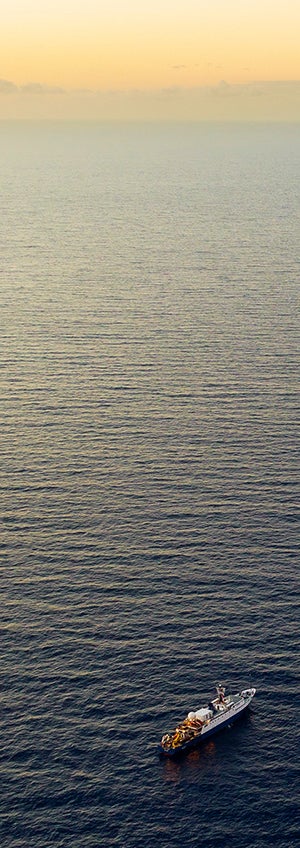
Aboard GSO, Fall 2024
Early one morning this November, as I walked my dog through the neighborhood, I realized it was 65 degrees and sunny…in November in New England. It struck me that the climate has really shifted, and we are facing a critical moment in human history. More than ever, the world needs an ocean- and climate-literate workforce to guide it through the shared challenges and opportunities that lie ahead. Many of those opportunities are in the Ocean State.
The ocean’s influence on life on Earth is profound, from coastal communities to central breadbaskets. Covering 71% of the Earth’s surface and averaging two miles deep, the ocean stabilizes climate, absorbs 90% of the greenhouse gases that warm the planet, and catalyzes the global economy through transportation, commerce, defense and energy. Ocean ecosystems provide us with crucial resources, from medicines to 17% of the world’s protein supply. The ocean is vital to all life on Earth, from jobs, to food, recreation and climate regulation. Yet, its resources and resilience are not limitless.
In the nearly thirty years since I first arrived at the Narragansett Bay Campus, we’ve witnessed significant advancements in ocean observing, thanks to U.S. investment. These advances have transformed our daily lives. Consider weather forecasts, which have become more accurate than ever due to federal expansion of global satellite and in situ observing systems, advanced supercomputing and a well-trained ocean workforce. Today’s capabilities in science and technology reflect decades of vision, and that vision now needs to focus on the ocean.
“The ocean is vital to all life on Earth… Yet, its resources and resilience are not limitless.”
There is still so much we don’t know. As of June 2024, nearly 75% of the global seafloor and the waters above it, as well as 60% of the U.S. Exclusive Economic Zone, remain unexplored and unmapped. Investing in ocean observing infrastructure and supporting programs will allow us to fill these knowledge gaps, offering critical knowledge on ocean health, weather, climate, maritime transportation, national security and resource management. This investment benefits not only science and policy, but also provides opportunities for experiential learning, enabling our students and professionals to become leaders in the new ocean literate workforce.
Science is in service to society. It is vital that we engage our partners in science, technology and industry to provide the best data and science to decision makers. The ocean holds vast, unrealized potential, but without the data to understand it, we risk falling behind economically, compromising national security and missing opportunities to sustainably manage its resources. The United Nations values ocean resources at $24 trillion—but those resources are finite and must be managed carefully.
We face a challenging moment in human history, and GSO is committed to advancing Earth system and ocean science in ways that connect exploration, discovery and research with social science, management, economics and policy. Together, we must create a community in the ocean sciences, build public trust and ensure that future generations are equipped to meet the challenges ahead.
These are exciting times for sure, and I look forward to what we will accomplish together in the years to come.
Wishing everyone the best in 2025,

Dean Paula Bontempi, Ph.D. ’01
